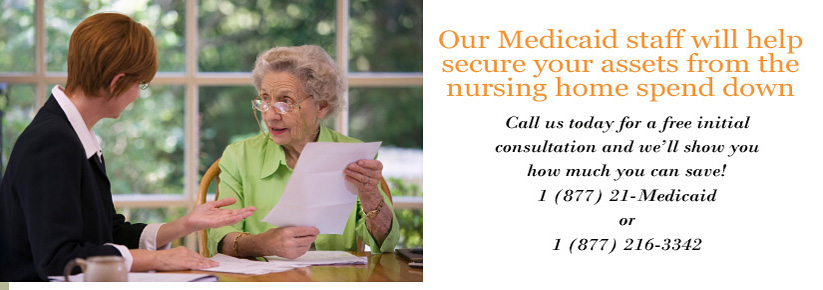Understanding estate recovery is an important part of being able to plan for Medicaid. Estate Recovery is a program that is required by Federal Law and it requires that the states recover any money that has been spent by Medicaid on long-term care services. The money must be collected from the estates of those who have received care after reaching the age of 55. The money will go to the Federal government, not the individual state. States that do not implement Estate Recovery can possibly be cut off from any future Federal Medicaid funding.
Assets are no longer exempt when Medicaid recipient passes away
This recovery does not create any debt owed by the heirs. Instead, it creates a claim or a lien against the assets that are in the recipient�s estate (the individual who received Medicaid benefits to cover for nursing home costs or any other long term care provision). The state agency will file a claim that is against the estate and then can enforce it just as any other creditor can. The assets that are considered to be exempt for the purpose of determining eligibility will no longer be exempt after the Medicaid recipient passes away.
How Medicaid Estate Recovery works
The amount of the claim will be the value of the amount that has been spent by Medicaid on the long-term care that was received and after the deceased person has reached the age of 55 or the value of the estate. It will be whichever of these two things that are less. If the assets that are in the estate cannot cover the costs to repay the claim, then the left over amount will be extinguished and it will not be considered a debt. There are some cases in which an estate recovery will not occur.
Medicaid Estate Recovery in effect if you are in a nursing home after age 55
Any person who received any Medicaid funded nursing home care after 55 will be subject to Medicaid Estate Recovery. It does not apply to the Community Care program that is administered by Senior Centers, nor will it apply to any care that has been delivered by a Home Health Agency. If nursing home care was received before the age of 55, Estate Recovery will not apply at all.
Some cases where Medicaid Estate Recovery will waive claim against estate
There are some situations in which the Medicaid Estate Recovery agency will waive the claim against the estate. If there is an adult child that has resided in the home and has provided care to the Medicaid recipient and then lived in the home until the death of the parent, there will be no Estate Recovery. This will also apply if an adult sibling of the Medicaid recipient has lived in the home and had a right to remain in the home after the death of the recipient. If the property in the estate is essential to a business owned by the family, or if the beneficiaries apply for a hardship waiver that shows the recovery of the state will hurt the family unit, the estate recovery will be waived.
Any Recovery of a recipient's estate will only be made after death of the surviving spouse and when there are no surviving children under the age of 21.
Read more information on Medicaid:
- Medicaid asset
- Medicaid Rules Purchasing Annuities
- Medicaid Transfer Assets
- Medicaid Gifting Rules
- Medicaid Joint Accounts
- Hide Assets from Medicaid
- Medicaid Assets
- Medicaid Home Equity
- Medicaid Laws
- Medicaid Annuity
- Medicaid Income First Rule
- Medicaid Long Term Care Insurance
- Medicaid Look Back Period
- Medicaid Life Estate
- Medicaid Loan
- Medicaid Deficit Reduction Act
- Medicaid Case Study





